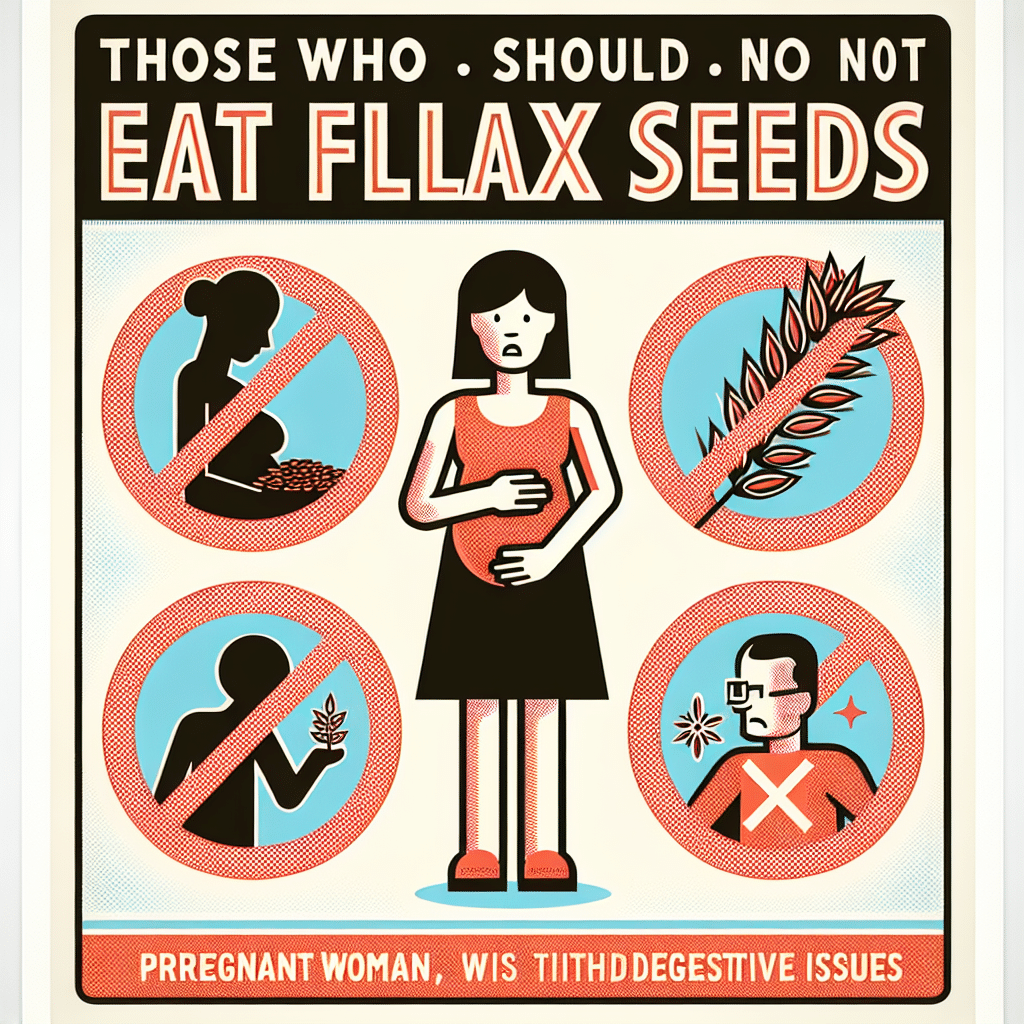Who Should Not Eat Flax Seeds?
-
Table of Contents
- Flax Seeds: Who Should Avoid Them and Why?
- Understanding Flax Seeds and Their Nutritional Profile
- Individuals Who Should Limit or Avoid Flax Seeds
- Pregnant and Breastfeeding Women
- People with Hormone-sensitive Conditions
- Individuals Taking Blood Thinners or with Bleeding Disorders
- People with Bowel Obstruction or Inflammatory Bowel Disease
- Individuals with Low Blood Pressure or Taking Antihypertensive Medication
- People with Allergies to Flax Seeds
- Those Scheduled for Surgery
- Case Studies and Research Findings
- Conclusion: Key Takeaways on Flax Seed Consumption
- Discover ETprotein’s Range of Protein Products
Flax Seeds: Who Should Avoid Them and Why?

Flax seeds have gained popularity as a superfood due to their high content of fiber, omega-3 fatty acids, and lignans, which offer a plethora of health benefits. However, despite their nutritional advantages, flax seeds are not suitable for everyone. Certain individuals should exercise caution or avoid flax seeds altogether due to potential adverse effects or interactions with medications. This article delves into the specifics of who should not eat flax seeds and the reasons behind these recommendations.
Understanding Flax Seeds and Their Nutritional Profile
Before we explore who should avoid flax seeds, it’s important to understand what they are and their nutritional benefits. Flax seeds come from the flax plant (Linum usitatissimum), a crop cultivated for its fiber and seeds. These tiny seeds are packed with nutrients that can contribute to a healthy diet.
- High in alpha-linolenic acid (ALA), a type of omega-3 fatty acid
- Rich in dietary fiber, both soluble and insoluble
- Contain lignans, which have antioxidant and estrogen properties
- Source of high-quality protein
- Low in carbohydrates, making them ideal for low-carb diets
Despite these benefits, there are specific groups of people who should be cautious about including flax seeds in their diet.
Individuals Who Should Limit or Avoid Flax Seeds
Pregnant and Breastfeeding Women
Pregnant and breastfeeding women are often advised to be cautious with flax seed consumption. Flax seeds contain lignans, which can mimic estrogen in the body. While moderate consumption is generally considered safe, high doses may have hormonal effects that could potentially affect the pregnancy or the baby’s development.
People with Hormone-sensitive Conditions
Due to the estrogen-like properties of lignans found in flax seeds, individuals with hormone-sensitive conditions such as breast, uterine, or ovarian cancer, endometriosis, or uterine fibroids should consult their healthcare provider before consuming flax seeds.
Individuals Taking Blood Thinners or with Bleeding Disorders
Flax seeds can have a blood-thinning effect due to their high omega-3 fatty acid content. Those taking anticoagulant or antiplatelet medications, such as warfarin or aspirin, should be cautious as flax seeds could increase the risk of bleeding. Similarly, individuals with bleeding disorders should consult their doctor before adding flax seeds to their diet.
People with Bowel Obstruction or Inflammatory Bowel Disease
The high fiber content in flax seeds can be a double-edged sword. While beneficial for most, it can exacerbate symptoms in people with certain gastrointestinal conditions. Those with bowel obstruction, acute diverticulitis, or inflammatory bowel diseases like Crohn’s disease or ulcerative colitis may need to avoid flax seeds to prevent intestinal blockages or flare-ups.
Individuals with Low Blood Pressure or Taking Antihypertensive Medication
Flax seeds have been shown to lower blood pressure. This can be a concern for individuals with hypotension or those taking blood pressure-lowering medications, as it may result in blood pressure dropping too low.
People with Allergies to Flax Seeds
Although rare, some individuals may have an allergy to flax seeds. If you experience symptoms like itching, swelling, or difficulty breathing after consuming flax seeds, seek medical attention immediately.
Those Scheduled for Surgery
Due to the potential blood-thinning effects of flax seeds, it is generally recommended to stop consuming them at least two weeks before any scheduled surgery to reduce the risk of excessive bleeding.
Case Studies and Research Findings
Several studies have highlighted the need for certain individuals to avoid flax seeds. For example, research published in the “Journal of Clinical Oncology” suggests that breast cancer patients, particularly those with estrogen receptor-positive cancer, should be cautious with flax seed consumption due to its phytoestrogen content. Additionally, a study in the “European Journal of Clinical Nutrition” found that flax seeds might interfere with blood pressure medications, necessitating careful monitoring.
Conclusion: Key Takeaways on Flax Seed Consumption
Flax seeds are a nutrient-dense food that can offer many health benefits. However, they are not suitable for everyone. Pregnant and breastfeeding women, individuals with hormone-sensitive conditions, those on blood thinners or with bleeding disorders, people with certain gastrointestinal issues, individuals with low blood pressure or allergies to flax seeds, and those preparing for surgery should avoid or limit their intake of flax seeds.
It’s essential to consult with a healthcare provider before adding flax seeds to your diet if you fall into any of these categories. By doing so, you can ensure that you’re making the best dietary choices for your specific health needs.
Discover ETprotein’s Range of Protein Products
If you’re looking for alternative sources of protein that may be more suitable for your dietary needs, consider exploring ETprotein’s diverse selection of protein products. ETprotein offers a variety of organic bulk vegan proteins that cater to different dietary restrictions and preferences.
Their product range includes Organic rice protein, clear rice protein, pea protein, clear pea protein, and various seed proteins such as watermelon, pumpkin, sunflower, mung bean, and peanut. These proteins are characterized by a neutral taste, non-GMO, and allergen-free attributes, making them an excellent choice for those who need to avoid flax seeds.
About ETprotein:
ETprotein, a reputable protein and L-(+)-Ergothioneine (EGT) Chinese factory manufacturer and supplier, is renowned for producing, stocking, exporting, and delivering the highest quality organic bulk vegan proteins and L-(+)-Ergothioneine. They include Organic rice protein, clear rice protein, pea protein, clear pea protein, watermelon seed protein, pumpkin seed protein, sunflower seed protein, mung bean protein, peanut protein, and L-(+)-Ergothioneine EGT Pharmaceutical grade, L-(+)-Ergothioneine EGT food grade, L-(+)-Ergothioneine EGT cosmetic grade, L-(+)-Ergothioneine EGT reference grade and L-(+)-Ergothioneine EGT standard. Their offerings, characterized by a neutral taste, non-GMO, allergen-free attributes, with L-(+)-Ergothioneine purity over 98%, 99%, cater to a diverse range of industries. They serve nutraceutical, pharmaceutical, cosmeceutical, veterinary, as well as food and beverage finished product distributors, traders, and manufacturers across Europe, USA, Canada, Australia, Thailand, Japan, Korea, Brazil, and Chile, among others.
ETprotein specialization includes exporting and delivering tailor-made protein powder and finished nutritional supplements. Their extensive product range covers sectors like Food and Beverage, Sports Nutrition, Weight Management, Dietary Supplements, Health and Wellness Products, and Infant Formula, ensuring comprehensive solutions to meet all your protein needs.
As a trusted company by leading global food and beverage brands and Fortune 500 companies, ETprotein reinforces China’s reputation in the global arena. For more information or to sample their products, please contact them and email sales(at)ETprotein.com today.












